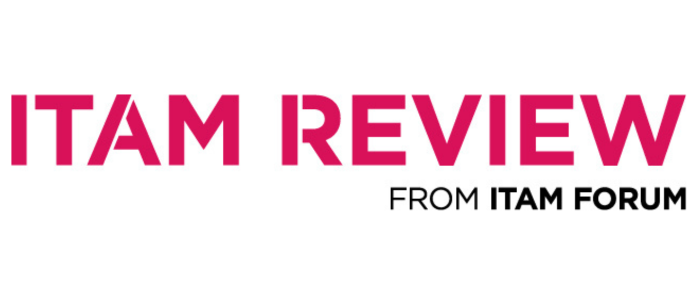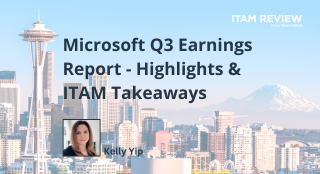Trouble Finding Oracle on Your Network?
 I spoke to Pat Durkin at IQuate as his team prepares to showcase their technology at Oracle OpenWorld 2009 next week.
I spoke to Pat Durkin at IQuate as his team prepares to showcase their technology at Oracle OpenWorld 2009 next week.
Pat described how they have adapted their technology to allow their customers to gain an accurate view of their Oracle installations.
Most large enterprises that use Oracle will be familiar with Oracle License Management Services (LMS) who approach them at least once a year and ask them to complete an Oracle Server Worksheet. Whilst the LMS team do their best to make this a positive experience, this is usually an arduous task that may take many weeks or months to complete.
Even if the customer has very good ITAM processes and solid tools, discovering all Oracle instances, processors, CPUS, sockets and transposing these details into the worksheet can be quite a challenge.
- The biggest challenge is physically locating the servers with Oracle installed, since the installation fingerprint of an Oracle application is different to most software. The traditional approach for inventory tools is to look at the existence, size and header information of .exe files which doesn’t work for Oracle. Pat said “In 100% of cases we’ve found discrepancies between what the DBA discovered and what was actually installed“
- Sometimes a DBA will inadvertently install costly database options during install that are not required.
- The price of a license sometimes depends on the processor rating which can be tricky. For example an administrator might login to the machine to inventory the number of cpus and find four, but in reality two dual core processors are installed which can have expensive consequences.
IQuate uses agent less technology to find Oracle instances on a network, using a combination of techniques including ports and processes running. The tool then, given the appropriate credentials, will connect to those Oracle instances in an agent less fashion and run the oracle scripts that generate the information that is critical for licensing. This information is then auto-populated into the Oracle Server Worksheet (See the sample Oracle Server Worksheet on the Oracle website here).
Working Example
IQuate were invited to validate a detailed manual Oracle audit which had been completed for a large public sector organisation. The manual process had already taken weeks of elapsed time and had been completed by their own internal Oracle DBAs and external advisory support.
During a 2 hour process, Pat’s team installed the software and scanned the IT estate. They discovered additional machines running Oracle, more instances than previously identified, detailed information on Database Options in use and an overstatement of 44% on the number of processors involved.

Pat admits that their company is not in the business of completing Oracle reconciliations but helping companies gather an accurate position. However generally he finds that as a result of their scans, customers typically find that they have a blend of under and over-licensing issues. They find servers that are unaccounted for (Which means the client owes Oracle more revenue) and database options that are overstated or not stated correctly (Which can deliver cost savings).
More about IQuate can be found here.
Can’t find what you’re looking for?
More from ITAM News & Analysis
-
Broadcom vs Siemens AG - A Brewing Storm
The ongoing legal battle between VMware (under Broadcom ownership) and Siemens is yet another example of why ITAM goes far beyond license compliance and SAM. What might, at first glance, appear to be a licensing dispute, ... -
Shifting Left Together: Embedding ITAM into FinOps Culture
During one of the keynotes at the FinOps X conference in San Diego, JR Storment, Executive Director of the FinOps Foundation, interviewed a senior executive from Salesforce. They discussed the idea of combining the roles of ... -
Addressing the SaaS Data Gap in FinOps FOCUS 2.1
I recently reported on the FinOps Foundation’s inclusion of SaaS and Datacenter in its expanded Cloud+ scope. At that time, I highlighted concerns about getting the myriad SaaS companies to supply FOCUS-compliant billing data. A couple ...
Podcast
ITAM training
Similar Posts
-
Microsoft Visual Studio Licensing Guide: Reduce Risks
(This article was reviewed and updated on 3 July 2025) Visual Studio Licensing Visual Studio subscriptions are licensed Per User with each licensed user able to. “install and use the software on any number of device”. ... -
Broadcom vs Siemens AG - A Brewing Storm
The ongoing legal battle between VMware (under Broadcom ownership) and Siemens is yet another example of why ITAM goes far beyond license compliance and SAM. What might, at first glance, appear to be a licensing dispute, ... -
Microsoft Power Apps: Current Pricing Models Comparison
Back in November 2021, Microsoft made Power Apps available under the pay-as-you-go (PAYG) model, alongside the traditional Per User/Per App options. This PAYG model has gained popularity. It ensures simple rightsizing for Power Apps environments. Here, ... -
Microsoft Q3 Soars as AI and Azure Growth Fuels Market Gains
On the 30th April, Microsoft released its Q3 quarterly earnings report, exceeding expectations and igniting investor optimism. Investors had been keeping a watchful eye on Azure’s Cloud performance after Microsoft’s Q2 Cloud results fell short of ...




